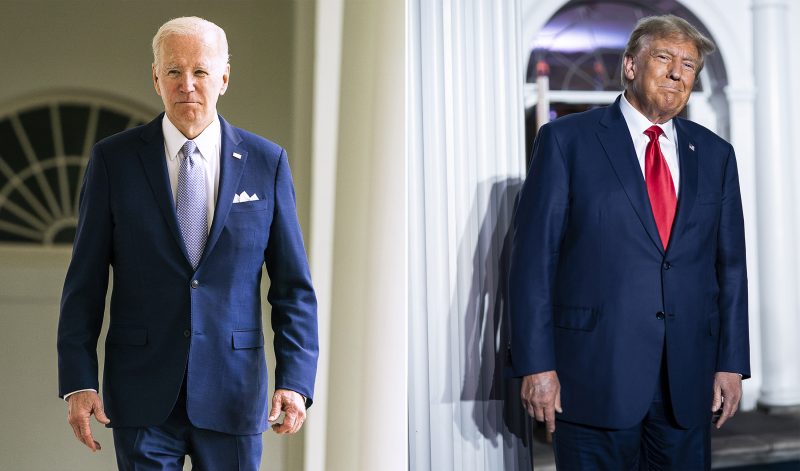Here comes the general election: Long, negative and consequential


Super Tuesday brought an effective end to the 2024 presidential primary season and with it the start of a long general election campaign between President Biden and former president Donald Trump that could be the most negative in modern times — and the most consequential.
Tuesday’s voting will be followed by Biden’s State of the Union address Thursday, and then both candidates will campaign at events Saturday in Georgia — an early pairing in a battleground state. While both will continue to secure the necessary delegates in upcoming primaries to guarantee their nominations, they will be focused almost exclusively on one another.
The general election begins with Biden and Trump displaying as many vulnerabilities as assets. Trump tried to overturn the 2020 election, is facing 91 felony counts and has threatened anti-constitutional actions if elected to a second term. Biden is already the oldest president in the nation’s history and is confronting doubts about his capacity to serve into his mid-80s as well as some of the lowest approval ratings of any modern incumbent seeking a second term.
Many Americans wish this were not the choice ahead. Some continue to imagine a race without one or the other, or both, at the top of their party’s ticket. Scenarios about an open Democratic convention or Trump somehow being disqualified flicker around the edges of the campaign. On Tuesday, as an example, the office of Michelle Obama declared that she will not be a candidate for president this year, putting to rest a far-right notion that has rumbled for months.
Barring something unexpected, 2024 will be a rerun of the 2020 election, though in a markedly different country and political climate. In 2020, Trump was the unpopular incumbent, the country was reeling from the worst pandemic in a century, the economy had fallen into a tailspin, and Biden benefited from a campaign strategy that kept him out of the limelight and Trump in it.
The 2024 election will carry its own set of fraught particulars: an attack on the Capitol on Jan. 6, 2021; Trump’s multiple indictments on charges stemming from that post-election period; and other issues, including the worst inflation in four decades, the lowest unemployment in roughly that same time frame and a Supreme Court decision ending a constitutional right to abortion that turned into the most explosive political issue of the time.
“There is no historical comparison for this election,” Democratic pollster Anna Greenberg said.
Past metrics that once helped foreshadow election results have been called into question. In 2022, Biden was low in the polls, yet his party outperformed expectations. Inflation was supposed to drag down Democrats, but instead abortion pulled down Republicans. The president drew criticism for focusing on threats to democracy instead of inflation late in the campaign, yet many Democratic voters were spurred to cast their ballots to diminish the power of a Republican Party that they saw as too extreme.
Polls show Biden trailing nationally and in many of the six battleground states where the competition will be the fiercest: Pennsylvania, Michigan and Wisconsin in the northern tier; Georgia, Arizona and Nevada in the southern tier. These late-winter polls are not predictive; many show the race within the surveys’ margins of error. Nonetheless, it’s true that in the 2020 cycle, Biden never trailed Trump in a single Washington Post-ABC News national poll and often led handily.
Reelection campaigns generally favor the incumbent. But Whit Ayres, a Republican pollster and no friend of Trump, sees Biden as the clear underdog. He cites public dissatisfaction with the overall direction of the country, and notes that Trump is seen as more trusted on the economy and immigration and that an overwhelming percentage of Americans see the incumbent as too old to hold the toughest office in the world.
Yet he added, “In this sea of uncertainty, I am hesitant to make a flat statement [about the outcome in November]. With two historically unpopular candidates, it feels less stable than it appears on the surface.” Still, he argued that the Democrats’ best chance of winning today “would be to find a different candidate.”
Greenberg, too, pointed to the unpredictable environment to emphasize her belief that past metrics are not necessarily a reliable guide this year. Never has a candidate for president faced the likelihood of splitting time between a courtroom trial and the campaign trail. So far, the indictments have helped more than hurt Trump, at least with the GOP base. Polls have indicated that a conviction could change the minds of some voters. But would it?
Trump will soon be in court in New York for the trial involving his payment of hush money to an adult-film actress and for allegedly falsifying business records to cover it up. Whether any of the cases involving efforts to overturn the election or his mishandling of classified documents goes to trial before the election is an open question, pending arguments before the Supreme Court and the justices’ subsequent ruling on whether Trump has immunity from prosecution, as he has claimed.
By many indicators, public memories of the chaos of the Trump years have faded. “One thing is clear,” said Sarah Longwell, a “Never Trump” Republican strategist. “Right now, [voters are] very focused on Joe Biden. They know what they don’t like about Joe Biden. But they’ve forgotten what they don’t like about Donald Trump. They don’t have the same visceral contempt for him that I saw going into the 2020 election.”
If the Biden team has anything to say about it, that will change in the months ahead — but only, his allies say, if there is a significantly amped-up campaign through surrogates, paid media across many platforms and an aggressive president taking the battle to his opponent.
Trump faced a slew of credible opponents in his bid for the nomination and blew past all of them, save for former South Carolina governor Nikki Haley, whose future as a candidate is probably dependent on the final results from Super Tuesday. Biden faced no serious opposition in the challenge from Rep. Dean Phillips (D-Minn.) and has cruised through the early states.
But even if the primaries produced no real surprises, they nonetheless helped to identify potential problems for Trump, particularly with college-educated and suburban voters.
Haley’s candidacy has shown that there is a portion of the Republican Party clearly uneasy with Trump. Longwell noted that roughly the same share of the GOP electorate that believes Biden was elected legitimately has been showing up to support Haley — somewhere between a quarter and a third of GOP voters.
“You can see this rough outline of a 70-30 split within the party,” she said. “The question then becomes how many of them will ultimately go for Trump or ultimately go for Biden, or stay home or leave [the presidential ballot] blank.”
The Democratic coalition that elected Biden in 2020 has softened. Younger voters and working-class men of color appear less enthusiastic about the president, raising questions about whether they will turn out in big enough numbers. The war in Gaza has divided Democrats, with many on the left seeing Biden as doing too little to restrain the Israeli government and military, and too little as well to protect Palestinian civilians in the war zone and lessen the humanitarian crisis there.
Some saw last week’s Democratic primary in Michigan, where roughly 100,000 voted “uncommitted,” as a genuine warning sign for Biden. Others, however, have discounted the significance, noting a history of uncommitted voting in that state’s primary. But no one questions that the Democrats have work to do to guarantee all their voters show up in November.
The Haley voters, particularly those identified as suburbanites, will become a special target for the Trump and Biden campaigns. These voters appear conflicted in their choice, happy with neither the leader of their party nor the Democratic president. But there are voters in the Democratic coalition with similarly conflicted views, frustrated with Biden and alarmed by Trump. “That’s why it will be the double-doubter election,” Longwell said.
For both Trump and Biden, the formula for winning support from voters unhappy with their choice will be to make the other candidate even more unacceptable, hence the prospect of a relentlessly negative campaign for months. In 2022, Democrats were able to win that argument by focusing voters on the extremism of Trump-backed candidates and the Trumpian GOP rather than on unhappiness with Biden.
Eight months of hard campaigning lie ahead.











